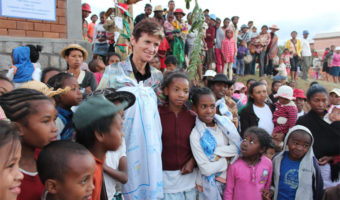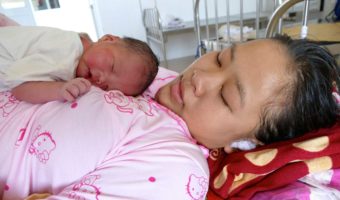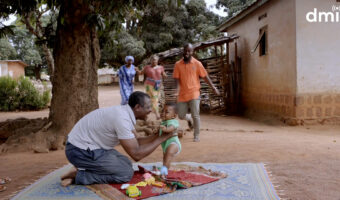Human capital is a country’s most valuable resource, and is increasingly recognised as one of the main vectors of economic growth. As the French philosopher Jean Bodin said: ‘there is no wealth but men’.
The development of Côte d’Ivoire is not conceivable if it is not taken into account. President Alassane Outtara has stated his ambition to make Côte d’Ivoire an emerging country by 2020. This includes structural transformation of the economy and increased investment in human capital. The 2012–2015 and 2016–2020 National Development Plans set out the vision of building human capital by investing in nutrition, health, social protection, education and literacy training but also by building on the collective experience of the people of Côte d’Ivoire.
At the heart of the fight against extreme poverty and the promotion of shared prosperity, Côte d’Ivoire has made human capital – and nutrition in particular – one of its priorities since 2012. The government identified the rate of stunting as a key indicator of poverty and child development. These commitments have been reaffirmed in the government’s Social Programme for 2019–2020.
Côte d’Ivoire joined the Scaling Up Nutrition movement at the G8 Summit in London in June 2013. Recognising that the causes of malnutrition are multifactorial, multidisciplinary and affect many development areas, the President created the National Council for Nutrition (le Conseil National pour la Nutrition) in July 2014, under my coordination in my previous role as Prime Minister.
The Council is a multi-sector, multi-stakeholder platform to encourage synergy and convergence of policies and operational initiatives. It brings together public entities, private sector networks, academia and research, civil society and development partners. The Council developed the National Multi-Sector Nutrition Plan for 2016–2020, which would cost USD 470 million. It aims at ‘improving the well-being of the population as a whole by guaranteeing an optimal standard of nutrition, and to provide lasting support for inclusive growth and development of the country’, with particular emphasis on the most vulnerable.
The plan goes well beyond the health sector – it also engages strategic sectors such as education and literacy, agriculture, farming and fisheries, social protection, the environment and water and sanitation. It considers the vulnerability and the empowerment of women, and focuses on nutrition during the crucial window of opportunity that is a child’s first 1000 days, from conception to age 2.
Investing in nutrition for young children
Together with stimulating interactions with parents and caregivers, adequate nutrition during early childhood plays an essential role in developing a child’s cognitive abilities and laying the foundations for future learning, good health and productivity in adulthood.
‘We have introduced sectoral policies to strengthen government actions as they relate to young children. The challenge is convergence and synergy.’
In October 2016, I participated in a summit on ‘Investing in the Early Years for Growth and Productivity’, held in Washington to coincide with the annual meetings of the World Bank Group and International Monetary Fund. During this summit, I reaffirmed our commitment to make significant investments in the National Multi-sectoral Nutrition Plan to reduce stunting in children and more generally, aid optimal development.
This plan, costed at CFA francs 266 billion (USD 470 million), was discussed at a roundtable for resource mobilisation which I personally led in September 2016. The contribution of the government will account for 15% of the overall cost.
Given the scale of the challenge and the need for rapid scale-up, we developed a nutrition and early childhood investment plan with the World Bank and other donors in May 2018, and USD 50 million was committed to build the sustainable foundations of human capital in line with the needs of our economy. In addition, foundation and Power of Nutrition funding was secured totalling USD 10.4 million.
By 2022, the project will contribute to scaling-up nutrition and early childhood development interventions in half of the country’s administrative regions.
Action on breastfeeding and other issues
We invest in early interventions to support the critical phases of children’s physical and cognitive development, and improve the lives of the most disadvantaged and vulnerable children and the society in which they live. These investments help to break cycles of poverty, violence and despair.
In parallel with this integrated policy that considers the different aspects of early childhood, we have introduced sectoral policies to strengthen government actions as they relate to young children. The challenge is the convergence and synergy of these policies.
In addition, we have put in place a legal and institutional framework for the promotion and protection of children. Côte d’Ivoire has ratified several international treaties for the protection of children, including the United Nations Convention on the Rights of the Child of 1989, ratified in 1991, and the African Charter on the Rights and Welfare of the Child of 1999, ratified in 2002.
Over the last few years, Côte d’Ivoire has adopted specific regulatory texts with regard to promoting and supporting breastfeeding, such as decree No. 2013-416, regulating the marketing of breast-milk substitutes, and law No. 2015-532 concerning the labour code as it relates to women and child labour, the protection of maternity and child education. The year 2015 was designated Breastfeeding Year by the Government. The law offers a framework that enables breastfeeding, which we are committed to strengthen in order to give more time to women who are breastfeeding and to give every child, woman, family and community the advantages of breastfeeding.
The priority the government puts on breastfeeding is further demonstrated by its inclusion in the National Multi-sectoral Nutrition Plan 2016–2020, and the implementation of the multi-sectoral breastfeeding action plan 2019–2021. Although more than 90% of women are breastfeeding, we have a relatively low rate of exclusive breastfeeding. We have set an ambitious target of increasing this from 12% in 2012 to 50% in 2020, and we are on the right track – the latest figure, for 2016, had increased to 23.5%. With this target in mind, we are working on scaling-up baby-friendly hospitals, strengthening the regulatory framework and involving all industries and stakeholders.
Encouraging results
The multisectoral approach to nutrition and early childhood is creating synergy by pooling efforts. Encouraging results were achieved between 2012 and 2016, and they now need to be consolidated.
According to the latest evaluations, (the MICS, annual statistics, surveys, reports on the situation of children), the mortality rate of children under 5 years old decreased from 125 per 1000 live births in 2012 to 96 in 2016 and the fertility rate decreased in the same period from 5 to 4.6 children per woman. This has been achieved in a context of the poverty rate falling from 48.9% in 2008 to 46.3% in 2015.
‘We are committed to give every child, woman, family and community the advantages of breastfeeding.’
Regarding nutrition, the percentage of children affected by stunting fell from 29.8% in 2012 to 21.6% in 2016. As noted earlier, exclusive breastfeeding rates are rising, and figures for initiation of breastfeeding in the hour following birth with skin-to-skin contact also improved, increasing from 31% in 2012 to 36.6% in 2016.
Regarding healthcare, President Outtara’s investments in upgrading infrastructure, technical equipment, human resources and accessibility are paying off. Universal healthcare coverage is a major pillar of government policy, including the principle of free healthcare for the most vulnerable groups and special attention to maternal and child health and antenatal care. The number of women who had at least one antenatal consultation increased from 91% in 2012 to 93.2% in 2016, and the number who had the recommended four consultations increased from 44.2% to 51.3%. The proportion of pregnant women who were attended by a qualified person during delivery improved significantly from 59% in 2012 to 72% in 2016. This improvement was also seen among the poorest households.
Regarding protection, the proportion of children under the age of 5 years whose birth was registered increased from 65% in 2012 to 71.7% in 2016, which should make it possible to reach the 75% target in 2020. During this period, the proportion of registered children with no birth certificate decreased from 19.5% to 12.2%.
When it comes to early learning, the government of Côte d’Ivoire recognises the need to follow up investments in a child’s first 1000 days with access to pre- primary education to ensure continuity of development. Pre-primary education has been proven to provide children with the skills needed to succeed in school, but less than half of children aged 3 to 5 years old have access to it in the world. In sub-Saharan Africa, according to UNESCO, this rate falls to 20%.
In Côte d’Ivoire, 14.3% of children aged 3 to 5 years old are currently receiving pre-primary education. In order to get this ratio up to 30% in 2025, the government has decided to build preschool classes into all new and refurbished school buildings. Additionally, the Education Services Improvement Project (Projet d’amélioration des prestations des services d’éducation) with a budget of USD 43 million, will install 117 community preschools between 2018 and 2022.
‘One of the challenges is to ensure that the system operates at an optimal level of performance in every municipality.’
Significant challenges are still to be met in all these areas. We must reinforce the gains mentioned above and fortify our efforts to scale-up the various projects that are currently underway. The legal framework must also be strengthened and existing measures effectively implemented. Furthermore, competences were transferred to relevant territorial levels by a law passed in 2012, and one of the challenges is to ensure that the system and cross-sectoral work operate at an optimal level of performance in every municipality in the country.
We know we can continue to rely on all our partners that work in the fields of nutrition and early childhood, and we are grateful for their support in order to offer dignity and a better tomorrow to hundreds of thousands of children.



